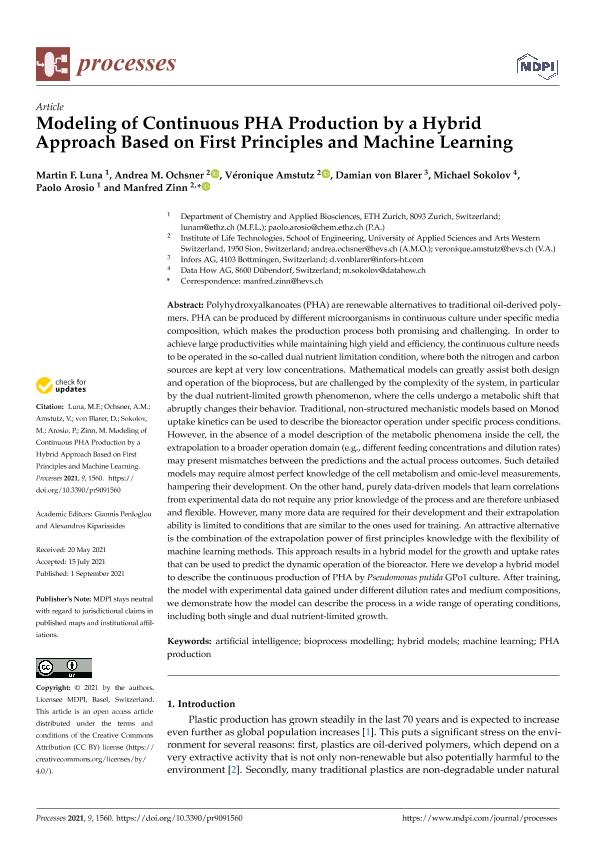Artículo
Modeling of continuous PHA production by a hybrid approach based on first principles and machine learning
Luna, Martín Francisco ; Ochsner, Andrea M.; Amstutz, Véronique; von Blarer, Damian; Sokolov, Michael; Arosio, Paolo; Zinn, Manfred
; Ochsner, Andrea M.; Amstutz, Véronique; von Blarer, Damian; Sokolov, Michael; Arosio, Paolo; Zinn, Manfred
 ; Ochsner, Andrea M.; Amstutz, Véronique; von Blarer, Damian; Sokolov, Michael; Arosio, Paolo; Zinn, Manfred
; Ochsner, Andrea M.; Amstutz, Véronique; von Blarer, Damian; Sokolov, Michael; Arosio, Paolo; Zinn, Manfred
Fecha de publicación:
01/09/2021
Editorial:
MDPI
Revista:
Processes
ISSN:
2227-9717
Idioma:
Inglés
Tipo de recurso:
Artículo publicado
Clasificación temática:
Resumen
Polyhydroxyalkanoates (PHA) are renewable alternatives to traditional oil-derived poly-mers. PHA can be produced by different microorganisms in continuous culture under specific media composition, which makes the production process both promising and challenging. In order to achieve large productivities while maintaining high yield and efficiency, the continuous culture needs to be operated in the so-called dual nutrient limitation condition, where both the nitrogen and carbon sources are kept at very low concentrations. Mathematical models can greatly assist both design and operation of the bioprocess, but are challenged by the complexity of the system, in particular by the dual nutrient-limited growth phenomenon, where the cells undergo a metabolic shift that abruptly changes their behavior. Traditional, non-structured mechanistic models based on Monod uptake kinetics can be used to describe the bioreactor operation under specific process conditions. However, in the absence of a model description of the metabolic phenomena inside the cell, the extrapolation to a broader operation domain (e.g., different feeding concentrations and dilution rates) may present mismatches between the predictions and the actual process outcomes. Such detailed models may require almost perfect knowledge of the cell metabolism and omic-level measurements, hampering their development. On the other hand, purely data-driven models that learn correlations from experimental data do not require any prior knowledge of the process and are therefore unbiased and flexible. However, many more data are required for their development and their extrapolation ability is limited to conditions that are similar to the ones used for training. An attractive alternative is the combination of the extrapolation power of first principles knowledge with the flexibility of machine learning methods. This approach results in a hybrid model for the growth and uptake rates that can be used to predict the dynamic operation of the bioreactor. Here we develop a hybrid model to describe the continuous production of PHA by Pseudomonas putida GPo1 culture. After training, the model with experimental data gained under different dilution rates and medium compositions, we demonstrate how the model can describe the process in a wide range of operating conditions, including both single and dual nutrient-limited growth.
Archivos asociados
Licencia
Identificadores
Colecciones
Articulos(INGAR)
Articulos de INST.DE DESARROLLO Y DISEÑO (I)
Articulos de INST.DE DESARROLLO Y DISEÑO (I)
Citación
Luna, Martín Francisco; Ochsner, Andrea M.; Amstutz, Véronique; von Blarer, Damian; Sokolov, Michael; et al.; Modeling of continuous PHA production by a hybrid approach based on first principles and machine learning; MDPI; Processes; 9; 9; 1-9-2021; 1-15
Compartir
Altmétricas



